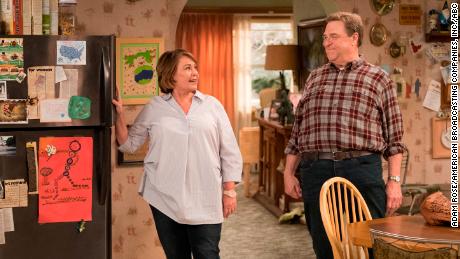Trump and 'Roseanne' are making a conservative case for representation in media


In the first episode of the revived series, real-life Trump supporter Roseanne Barr plays fictional Trump-supporter Roseanne Conner, who argues politics with her pussyhat-wearing sister. Barr’s character is a rarity, a pro-Trump character in a mainstream show that depicts a working-class family, and the ratings felt like a vindication for many who feel Hollywood does not represent them.
More than 18 million people tuned in for the revived series’ debut Tuesday on ABC. Trump made a personal phone call to Barr and boasted about her ratings at his rally in Ohio Thursday. Ivanka Trump followed Barr on Twitter and Donald Trump Jr. tweeted his support for the show. Sarah Palin posted a photo with Barr on Instagram along with screenshots of Drudge Report headlines about it, and Sean Hannity invited Barr onto Fox News.
There is undoubtedly a “celebrity gap” in politics that favors the left. Liberals have an army of actors, musicians, athletes and reality stars who are public and vocal about their politics, while conservatives do not have as many celebrity supporters. It showed at the 2016 Republican National Convention. Trump promised “showbiz” but was only able to deliver Willie Robertson from “Duck Dynasty” and Scott Baio from “Happy Days.” And Trump’s inauguration lacked the megawatt star power of that of former President Barack Obama’s.
While Trump has been dismissive of his inability to attract or impress A-listers from the entertainment world, his quick reaction when barometers of pop culture are in his favor suggest he appreciates it when he can. He’s tweeted about Jackie Evancho’s album sales after she was announced an inauguration performer and about the Oscars low ratings (poor awards show ratings being a favorite data point for conservatives, pointed to as proof their anti-Trump monologues are unpopular). And in his praise of “Roseanne” in Ohio, he suggested the mainstream media hadn’t “figured it out yet.”
“Over 18 million people,” he said. “It was about us.”
It’s a lesson Hollywood learned last month with the blockbuster success of “Black Panther,” with its five-week No. 1 box office run bringing in $635 million. Same goes for 2017’s “Wonder Woman.” People like seeing themselves represented in the media they consume, whether that’s a black super hero or a white, blue collar family with a member who supports Trump.
Let’s block ads! (Why?)


